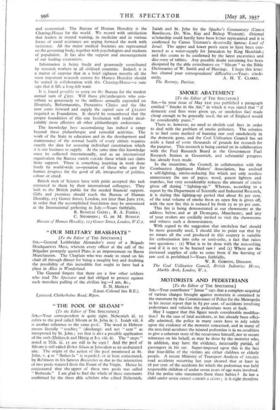"THE POOL OF SILOAIVI " [To the Editor of THE
SPECTATOR.]
Sr,—Your correspondent is quite right. Nehemiah iii. z refers to the pool called Siloam at St. John ix. 7. Isaiah viii: 6 is another reference to the same pool. The word in Hebrew means literally " sending " (discharge) and not " sent " as interpreted by St. John ; yet that is also a possible application of the verb (Delitzsch and Hitzig at Isn. viii. 6). The " steps " noted at Neh. iii. n5 are still to be seen ! And the pool of
Siloam is still called Birket Siluan at Jerusalem as an undisputed site. The origin of the action of the pool mentioned at -St. John, v. 4 as " Bethesda " is regarded, or at least conjectured, by Robinson in his famous Researches as due to the interaction of two pools watered from the Fount of the Virgin. Hence he conjectured that the upper of these two pools was called
"Bethesda." I am glad to find the whole of these statements confirmed by the three able scholars who edited Nehemiah,
Isaiah and St. John for the Speaker's C.anmtentary (Canon Rawlinson, Dr. Wm. Kay and Bishop Westcon). Oriental scholarship could hardly have been better represented and it is confirmed by Canon Tristram's deservedly. famous Land of Israel. The upper and lower pools seem to have been con- nected as a water-supply for Jerusalem by King Hezekiah ; and this seems to be confirmed by the latest excavation and
disc overy of tablets. Any possible doubt remaining has been dissipated by the able contributors on " Siloam " to the Bible Dictionaries of W. Smith and of Hastings. I hope this letter has cleared your correspondents' difficulties.—Youn obedi-






































 Previous page
Previous page